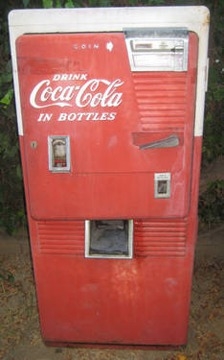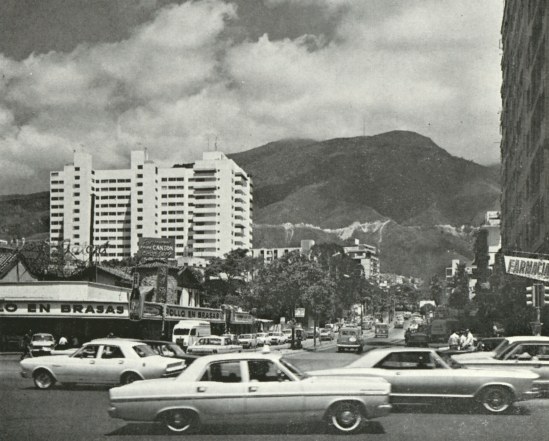 Orlando Salazar was born and raised in Caracas, Venezuela, a bustling city filled with large buildings and surrounded by large mountains, pristine beaches, and vast hills. When Mr. Salazar was growing up in the 1950s, Caracas was not filled with the crime or poverty that it is today. He also noted that racism was not a problem, saying that Venezuelans as a whole are “a mixture, that’s what makes [us] beautiful.” For the most part, people living in the city were personable and treated each other with respect.
Orlando Salazar was born and raised in Caracas, Venezuela, a bustling city filled with large buildings and surrounded by large mountains, pristine beaches, and vast hills. When Mr. Salazar was growing up in the 1950s, Caracas was not filled with the crime or poverty that it is today. He also noted that racism was not a problem, saying that Venezuelans as a whole are “a mixture, that’s what makes [us] beautiful.” For the most part, people living in the city were personable and treated each other with respect.
His family, consisting of mom Cristina, dad Alfredo, and three younger brothers, Alfredo, Richard, and Leonardo enjoyed a relatively comfortable lifestyle. Orlando’s youngest brother Leonardo is seventeen years his junior, so the two only spent about a year together prior to Orlando’s departure for the United States. While in Venezuela, Orlando took vacations to his uncle’s coco hacienda near the beach with his family whenever time allowed.
Mr. Salazar shared a fond memory of a month spent vacationing at his uncle’s hacienda, a month in which a bathing suit was the only article of clothing he wore. Days were spent playing around – “catching crayfish, running through the jungle, and picking up fruit” or whatever else he could find. For example, if he found tubers one day, he’d pick them from the ground and cook them, like the castaways “on the TV show Survivor.” To Americans or those who vacation in Central America, this image of relaxation and fun at the hacienda is how tropical countries are often seen, but this was not the reality of quotidian life for Orlando.
As a child, Orlando started school at the age of five when he attended a private Montessori school. Orlando said that he doesn’t remember much from Montessori school “except for the first time [he] got a bottle of Coke out of one of those machines – [he] had never seen one of those machines. Those little bottles of Coca-Cola that’s the only thing [he] remembered about that school, [he] didn’t remember being there.”
After Montessori, Orlando attended a public school for one year followed by ten years of private schooling at St. Francis of Sales Catholic School from first grade to sixth grade and high school. Unlike the U.S., Venezuela replaces middle school with a five-year high school program explaining his jump from sixth grade to high school. Orlando learned the English language while attending St. Francis of Sales Catholic School, but his conversational skills were far from perfect. During our conversations, it was clear that he was not particularly fond of the strict Catholic schooling regimen that held classes seven days of the week! As a result, Orlando was not very religious as a child, nor is he today, even though he still identifies as Catholic.
Outside of school, he spent time with the variety of friends he made both in and outside of school. It was not uncommon to find Orlando’s group of friends hanging out on the corner, playing the guitar, or chasing girls – whistling at those whose looks caught their attention.
When speaking of times spent with his friends, Orlando said:
“We grew up in the street, you know go [running] in the middle of the street…One thing I remember fondly is that we used to go roller-skating in the streets at Christmas time there was a period of, from the seventeenth of December to the twenty-third where they have what they call it Misas de Aguinaldo is a midnight…rooster mass in the morning. So I don’t know what they call it, but I know that we used to go in groups roller-skating in the streets and during the day we’d do the same thing, but in the middle of traffic and dodging traffic and something. But at night they had those things that you go in and from ten o’clock to six o’clock in the morning you roller-skate and they have vendors in the street and they have the streets blocked. They did, they don’t do that anymore. And then at six o’clock there was a mass, which I always missed. I was [tired of mass], after ten years of Catholic schooling and the regimen, cause it was like seven days a week. So, I knew they weren’t gonna get me on that one.”
In addition to time spent with friends, Orlando was close with his family, especially his father and paternal grandfather. Orlando’s father Alfredo was well known and respected in the community as a sports connoisseur – a man who “was always the star [in] any sport he played.”
When referring to his father, Orlando stated:
“My father used to find me and my friends hanging around the corner talking. That’s when we [were], I was about fifteen, sixteen, and he’s driving home for something and he sees us hanging around the corner he says, ‘Get in the car.’ He would take us to the stadium to watch a track meet or a game…anything [that] had to do with sports.”
Orlando’s “father was the Vice President of the boxing federation in Venezuela for many years, and [Orlando] used to go with him almost every Monday night to…the amateur fights.” Attending Monday night fights was one of Orlando’s favorite routines that he shared with his father back in Venezuela, adding that his dad also allowed him to “spar with the fighters sometimes in the gym!”
Another person who was mentioned many times during our interviews was Orlando’s grandfather Jose. The two often spent time together walking the entire city of Caracas, so much so that they practically knew the city’s streets by heart.






